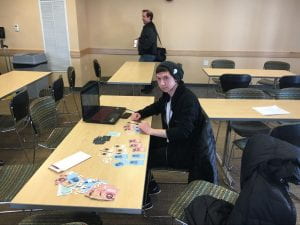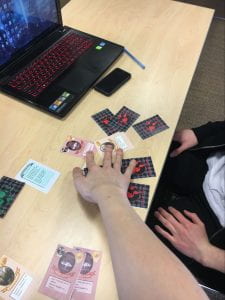

Overview
My game is called “M.A.D.” which means Mutual Assured Destruction. It is a term being used during the Cold War as a game theory that if both country could guarantee to destroy the other one , they wouldn’t actually do it because of the counter-attack.
Game Instruction
There are three type of Field Cards, that each player can hold.
- At the start of each turn, player draw a population card.
- Each population card can provide functionality of 2 other building cards.
- Requires population to function.
- Cost 1 gold per turn to maintain.
- Has 2 nuclear power.
- Cost 4 gold to buy.
- Requires population to function.
- Generates 1 gold per turn.
- Cost 2 gold to buy.
Start-Game
- Each player 2 factory and 1 population when the game starts.
Phase-Population Growth
- At the start of the turn, unless specified, player get a population card.
- Once Population Growth is done, go to Resource Maintaining.
Phase-Resource Maintaining
- Player discard the cards that does not have enough population to function. They can decide which ones to discard or trade, as long as they have their buildings functioning with enough population at the end of this stage.
- Player gains 1 gold for each Factory they have, unless specified.
- Player spends 1 gold for each Nuclear they have. If they can’t afford maintaining it, they have to discard or trade with other people to maintain it.
- Once Resource Maintaining is done, player can go to attack phase.
Phase-Attack
- On player’s turn, they can choose to attack another player if they have at least 1 nuclear power.
- Once a player is attacked, the attacked player shuffle their field card face down, and let the attacking player pick certain amount of random cards equal to the attacking player’s nuclear power, and discard them.
- Once that’s done, and if the attacked player still has any nuclear power, they can choose to immediately counter-attack the attacking player. The nuclear power counted for the counte- attack includes the cards that has just been discarded through the previous attack.
- Therefore, the counter attack works like either all, or none.
- Player can only attack once per turn. Once attack is done or skipped, go to Purchase.
Phase-Purchase
- Player can buy field cards from the pile during this phase.
- Since it’s the last phase, what they bought can’t be used immediately.
Special Phase- Trade
- Player can trade and discuss with each other at ANY time.
- They can trade any resource, including gold, population, factory, nuclear, and so on.
Event-Cards
- At the end of each Round, an event card is revealed and played.
- There are four type of events right now, and more can be added in the future.
- Nuclear Winter:
- If any nuclear strike has been performed this round, place this card on the table, otherwise discard it.
- Whenever a total of 3 Nuclear Winter have been placed, the game ends with no winner.
- Non-Proliferation:
- Players vote for this treaty.
- If half or more players agreed, players discard all their Nuclear cards and get a full refund.
- Economic-Crisis:
- Field cards cost 100% more next round.
- No Population growth next round.
- Baby Boom
- Place a Population card on the center of table.
- Players can bid on it with a starting price of 2 * Gold.
- Nuclear Winter:
Condition – Defeat
- Whenever a player has no field cards, that player is “defeated”.
- The last player hasn’t been defeated wins the game.
Reflection of playtest
Usually the first player gets some advantage. However, if played with three or more people, the last several players are often united to play against the first player. Due to the trade rule, they can easily share their resource through this way.
During the playtest in class, similar things happened. Moreover, the Nuclear Winter really added something to the game. Once a player decides to attack, they need to consider a lot of things, such as “Will I be counter-attacked?”, “What if Nuclear Winter happens?”. And as intended, the first playtest ended with three nuclear winter played, which means the games ends with no winner.
There are also ways to improve the game. I could make event cards to reverse the order since next round, which decreases the first player’s advantage, as well as create some aspects of surprise in the game.
Artists Statement
My goal of making this game is to recall the days of the Cold War, and extend to the real world problem of Nuclear Weapons. Nuclear Weapon has first in the history allowed human beings to fully destroy a civilization. Nowadays more and more countries that failed to be recognized globally started to seek for nuclear power instead. Through this game, players could experience a similar decision making process of the countries involved, and understand the reason why it’s really challenging to maintain the world peace and keep the world from a Doomsday.
During the decision-making in the gameplay, there are several factors that I want players to take into consideration. The way they understand nuclear bomb is like a deterrent that reduce the chance of being chosen as a target. At the same time, if there are some target that they can attack without worry about being counter-attacked, they would attack them to establish more advantage. For players that are not leading the game, they are more likely to have some nuclear bombs to warn other player “Don’t touch me”, which is indeed the same strategy that some countries in real life have chosen.
The population is an important part of design. Since the factory provides gold, and gold can be used to buy factory, it’s basically an exponential growth. With population involved, the growth is pretty much limited because of the fact that players can only get one population per turn. Then the extra population gained from event “Baby Boom” might be important to make a big difference and is certainly something worth a competition.
Since everyone start with no nuclears, the first player to have nuclear bomb might put them into a situation that no one can resist their attack. It means that other player need to react to the first purchase of Nuclear Bomb, and probably also start buying Nuclears.
On the flip side, nuclears costs resource to maintain. Getting a nuclear bomb too early might deeply influence their efficiency of resource gathering. Furthermore, they need to consider the chance of getting a nuclear winter at the end of the round, which results in a no-win situation. There is no obvious best strategy. Anything happened can change one’s strategy set and put them into a different situation.
No matter what players choose, most of time they get into a situation that they have to attack, and nuclear winter happens. Then, more nuclear winter happens and the game ends with no winner. In real world, the overuse of nuclear weapon may result in a same outcome that nobody actually benefit from that act. It’s a situation that when everyone plays their best strategy to survive, it actually leads to the worst result.
According to Brian Schrank’s diagram defining the different types of avant-garde games, M.A.D. contains a certain flow and serves as a Complicit turn-based strategy board game. The intended situation of nuclear winter is also something political and happens all the time which aparts it from a traditional game.
The idea of the game is inspired from the Sept. 12 made by Gonzalo Frasca. In the game player plays the role in a real-life problem, and get to know where their situation is and make a statement based on that. The Avant-garde movement has plays a part in it, especially with the anti-war concept in some of the Dada artworks. Though Dadaism is often only considered as a react of WW1 happened in 1910s, it can still be applied to the time of the Cold Wars. Even today, nuclear is still served as a symbol of power, while most country has ignored the fact that, the more nuclear power exist in the world, the more unstable the world is.
